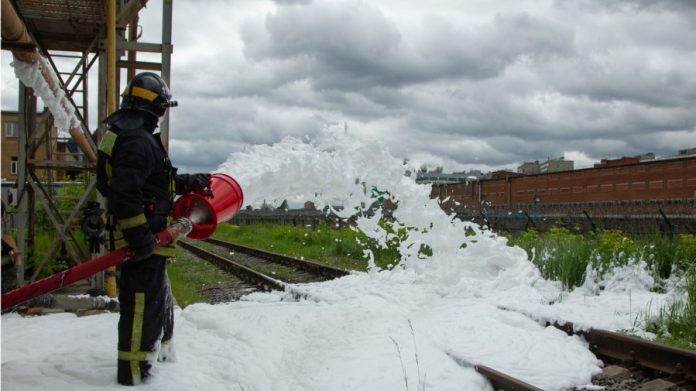
Provisions in the House and Senate annual defense authorization bills reduce restrictions on the Pentagon’s use of “forever chemicals.”
In the House, one such provision is generating pushback even from Republicans.
“Forever chemicals” are the nickname for a family of man-made chemicals known as per- and polyfluoroalkyl substances (PFAS). These chemicals, which have been linked to health issues including cancer, have been used by the military for years in firefighting foam.
They have also been used in firefighter gear used by the military and civilians, as well as in common products including nonstick pans, fast food packaging, clothing, furniture, cosmetics and more.
As the public and policymakers became more aware of the hazards posed by these substances, past iterations of the National Defense Authorization Act (NDAA) have restricted the military’s use of them and sought to require it to clean them up.
This year, however, the legislation seems to be rolling back some of those restrictions.
The House version of the bill contains a provision that delays the phaseout of the use of forever chemicals in military firefighting foam.
Previous bills required the military to stop using PFAS-laced firefighting foam by October 2024, with some possibilities for extension, but, if the measure passes, the military will be able to purchase new foam with these chemicals through 2026, with advocates fearing this will extend its use.
“The language would extend their ability to purchase and use” PFAS-containing foam until October 2026, said Jared Hayes, a senior policy analyst at the Environmental Working Group, adding that it also allows the military “to file new one-year waivers, so we’re looking at another three years of them being able to purchase and use PFAS firefighting foam.”
He said that extension waivers would be expected to restart the military’s ability to use two one-year waivers, meaning the use of this foam would be expected to be allowed until 2028.
“This really exacerbates the contamination problem … We’re going to see more contamination, driving up cleanup costs and essentially condemning more defense communities and another generation of service members,” Hayes added.
The Senate bill, meanwhile rescinds prohibitions on the military’s ability to purchase cookware, carpets and rugs that contain two of the most toxic types of forever chemicals.
It also lifts a restriction on the military’s ability to incinerate PFAS, a controversial and debated method of disposing of these substances.
If both bills pass as-is, it’s not clear which of these provisions, if any, will make it into the final version, as lawmakers will have to confer to address differences before sending it to the president’s desk.
On the House side, the delay provision was met with pushback, including from some moderate Republicans.
GOP Reps. Brian Fitzpatrick (Pa.), Jen Kiggans (Va.), Mike Lawler (N.Y.) and Nick LaLota (N.Y.) introduced an amendment to repeal the contentious House provision, but the amendment ultimately did not make it into the bill, which is slated for a vote on Wednesday afternoon.
“Delaying the phaseout would only extend that harm and put our servicemembers, firefighters, and their families at greater risk,” Fitzpatrick spokesperson Casey-Lee Waldron told The Hill in a statement while the amendment was still under consideration.
She added that the congressman and his colleagues “are determined to keep the phaseout on track and prepared to fight for this critical public health priority on the Floor.”
A spokesperson for Rep. Jack Bergman (R-Mich.) who leads the House Armed Services subcommittee that deals with environmental issues, did not respond to The Hill’s requests for comment.
On the other side, Sen. Jeanne Shaheen (D-N.H.) introduced amendments to ax the provisions related allowing incineration and the purchase of cookware and similar products.
“PFAS exposure can have drastic consequences for long-term health — why wouldn’t we take every chance to protect service members and their families from these harmful chemicals?” Shaheen told The Hill in a statement.
“That’s why I fought to enact a moratorium on incinerating PFAS until it can be fully destroyed without polluting our air. I’ll keep working to put a stop to Republican efforts to remove provisions in law that protect our service members and communities from unnecessary exposure to PFAS,” she said.
The office of Senate readiness subcommittee Chair Dan Sullivan (R-Alaska) pointed The Hill to a study that found that a particular PFAS incineration facility was more than 99.9 percent effective at destroying the compounds.
“The moratorium on incinerating PFAS chemicals was put in place to ensure the science supported it as a safe and effective disposal method. It has since been shown in a comprehensive 2022 study to be 99.9999% effective,” said a spokesperson for Sullivan.
“Despite this, the Biden Administration slow-walked issuing the guidance necessary to lift the ban…leaving mounds of PFAS-laden soil in piles on our military bases. Senator Sullivan’s provision doesn’t mandate incineration, but it removes an unnecessary restriction and gives DOD back a safe and effective disposal option that doesn’t require shipping waste out of state,” they added.
Anti-PFAS activist Diane Cotter, who voted for President Trump, has said she feels let down by the GOP on the “forever chemical” issue.
“I’m so sick of seeing congressionals stand for photo ops with firefighters and then vote this legislation down or chip away at it,” said Cotter, whose husband Paul was a firefighter who had cancer but is now cancer-free.

